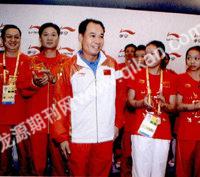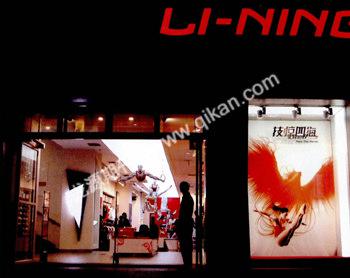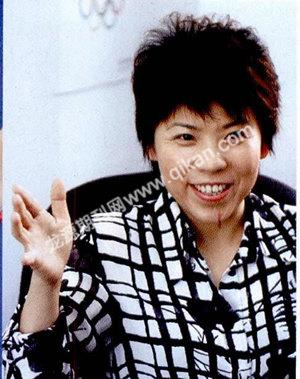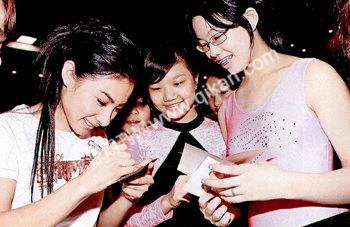After Gold,What’s Next?
By DE YONGJIAN
When Chinese badminton player Zhang Ning won gold for a second time in the womens singles at the Beijing Olympics, she knelt on the ground and cried. Tears were still running down her cheeks when she mounted the podium. No doubt this was partly because the victory was also a farewell: soon after successfully defending the Olympic championship, the 33-year-old Zhang announced her retirement, bringing her 23-year badminton career to an end.

Zhang Ning is one of a large number of Chinese athletes who retired after the Beijing Olympics. Many held on so they could compete on home soil, regarding the event as a fitting end to their sporting careers. A few will continue only until the National Games next year. At this moment, they are all facing the question that confronts every athlete when their sporting careers are over: what to do next?
As Chinas economy continues to grow, more and more retired athletes move into fields like business and entertainment. Obtaining work through administrative order and being appointed to a position such as a coach is not as easy as in the days of the planned economy, so the majority seek employment in the private sector. Accordingly, athletes post-sporting lives are becoming increasingly colorful.
Raking in the Millions
During the opening ceremony of the Beijing Olympics on August 8, Li Ning, the former Chinese male gymnast who won three gold medals at the 1984 Los Angeles Olympics, galloped along the rim of the “Birds Nest” and lighted the Olympic flame in front of a TV audience of millions. Before he retired at the end of 1988, Li won over 100 gold medals in various competitions, becoming widely known in China as the “gymnastics prince.” He now owns the sportswear manufacturing giant Li Ning Co., Ltd. with a market value of US $1.8 billion, making him the “business tycoon” of Chinas former athletes.

Although he was the most successful male gymnast in Chinese history, Li Ning faced a dilemma when he retired in December 1988. In September that year, he abruptly fell from the summit of the gymnastics world when he made several errors during the Seoul Olympics. He subsequently suffered piercing sarcasm upon his return home.
China was still under a planned economy at the end of 1980s, and retired sporting stars obeyed administrative orders, generally becoming coaches or sports officials. Surprisingly Li Ning made a different choice. He was determined to go into business. He became the special assistant to the general manager of the Jianlibao Group in 1989, and a year later established his sportswear company.
After nearly two decades Li Ning has become a leading sports brand in China, and Li Ning himself now ranks as one of the countrys richest people. His lighting of the Olympic flame on August 8 is said to have been an enormously successful advertisement for his company, which will no doubt considerably increase the popularity of his brand.
Lis success in business has provided a model for other retired athletes, and has made star players realize their commercial value. As the market economy was gradually established in China during the 1990s, increasing numbers of retired athletes opted to go into business. The most common route is to set up sports clubs or sporting goods companies. Famous brand names now include the company named after Li Xiaoshuang, winner of the mens all-around artistic gymnastics at the 1996 Atlanta Olympics, and the sports and cultural development company created by Lou Yun, gold medalist in the mens horse-vaulting at the 1988 Seoul Olympics.
Moreover, Yang Xi, a member of the Chinese Womens Volleyball Team that won the world championships in 1981 and 1982, went on to become a property developer. Yangs personal assets have swelled to over RMB 100 million, putting her in the same league as Li Ning. Zhuang Yong, the champion of the womens 100m freestyle at 1992 Barcelona Olympics, manages a media company. Her teammate Yang Wenyi, who won the womens 50m freestyle at the same Games, set up a sports communication company and a swimming club.
The Political Path

During the Beijing Olympics, Deng Yaping, winner of both the womens table tennis singles and doubles for two successive Olympics, frequented various news conferences. As the deputy head of the Olympic Village Department, she was one of a few retired athletes to take up an official post with BOCOG (Beijing Organizing Committee for the Games of XXIX Olympiad).
Compared to older generations of retired athletes, Deng Yaping is not the highest in official rank, but her brilliant school record and high degree of internationalization set her apart from others. Besides being appointed as the deputy head of the Olympic Village Department in March 2007, Deng is a member of the International Olympic Committee Athletes Commission and a member of the National Committee of the Chinese Peoples Political Consultative Conference.
Deng held the top ranking in womens single table tennis for eight years until retiring in 1997 and entering Beijings well-known Tsinghua University to study English. It is common for retired athletes to study once they have finished their sporting careers. Young people with the highest potential are sent to professional sports centers at a young age, where all costs are covered by the government, so they are engrossed in training and sports achievements rather than education. Even if they continue to study, the exhausted athletes are hard pressed to concentrate. Lacking systemic schooling and other professional skills, most elect to study at university once they finish their sporting careers. However many former athletes find it difficult to keep up with university study due to their minimal education, and some end up dropping out.
Although Dengs English was poor when she first studied at Tsinghua, shenever shrank from a challenge. On the contrary, she set aside 14 hours a day to study, and worked so hard that at one point her hair started falling out. After months of assiduous labor, she went on exchange to the UKs Cambridge University to study English in early 1998. This turned out to be an even tougher school experience.
To catch up with other students at Cambridge, Deng only slept a few hours a day and usually had instant noodles for dinner. No pain, no gain. After she graduated in 2001 she could speak fluent English with native speakers. Deng continued to make persistent efforts and in September 2002 she obtained a Masters degree from the University of Nottingham in Britain.
Presently Deng is working towards a doctorate in economics at Cambridge University. The former “queen of table tennis” has achieved an impressive academic record through willpower and persistence. “Youve got the key to access the world,” wrote former IOC president Juan Antonio Samaranch in the prelude to Dengs Masters thesis.
Quite a lot of Chinas retired sports stars have chosen to become government officials. Cai Zhenhua, former world champion in mens table tennis, is now the deputy director general of the General Administration of Sport in China. Xu Haifeng, a former marksman who won Chinas first Olympic gold medal in 1984, is now deputy director of the Chinese Cycling and Fencing Administration Center. Xiong Ni, the gold medalist of the mens 3m springboard at the 2000 Sydney Olympics, was appointed as the deputy director of Hunan Provincial Bureau of Sports at the age of 30, making him the youngest bureau-level official in Hunan.
Coaching the Next
Generation

Numerous retired athletes in China are now coaches. The experience of Lang Ping, a former member of Chinese Womens Volleyball Team, is representative. At both the 1996 Atlanta Olympics and the 2008 Beijing Olympics, a team coached by Lang reached the final. Lang herself won gold as part of the Chinese Womens Volleyball Team at the 1984 Los Angeles Olympics, so she has been closely involved in three Olympic finals.
As a player, Lang was known as “iron hammer,” and helped her team win five successive world championships. During the 1980s Lang Ping and her teammates became legends in China and were regarded as “national heroines.” Lang Pings image and the team photo were commemorated on stamps, coins and souvenir badges.
Lang was forced to retire at the height of her career in 1985 due to serious injuries. She remained involved in volleyball however, joining a club in Italy in 1989, and returning to China a year later to assist the Chinese Womens Volleyball Team win silver at the 11th World Womens Volleyball Championships held in Beijing.
Langs coaching career started in the 1990s. By the middle of that decade, Chinas national team had slipped to eighth in the world rankings. Lang was lured back home to coach the Chinese team and pull it out of the doldrums. Within 18 months the team took the silver medal at the Atlanta Olympics, much to everyones surprise. After the team was runner-up in the 1998 World Championship, Lang left for a second time.
In 2005, Lang accepted an invitation to coach the U.S. Womens Volleyball Team. A close friend of hers disclosed that Lang considered the offer carefully before accepting, afraid that coaching a foreign team might hurt the feelings of the Chinese people. If the Americans played the Chinese, she wouldnt be able to bear the pressure from her countrymen. As she considered what to do, an online survey showed the majority of Chinese netizens understood Lang Pings position. Their tolerant and gentle attitude impelled Lang to accept the offer.
Under Lang, the U.S. team made miraculous progress. The Americans, under Langs guidance, spared no effort in defeating the Chinese team, and then achieved a convincing victory over Cuba in the semi-final of the Beijing Olympics. Finally they took silver medal.
On the evening of August 15, during the match between the U.S. and China, Chinese president Hu Jintao and his wife turned up to watch the game. The U.S. won three to two. When Lang Ping left the hall, the Chinese audience responded with warm applause. In the final the audience treated the Americans as if they were the home team. Apparently Langs status of “national heroine” has never changed.
Entering the World of
Entertainment
There is a saying in China that “recreation and sports are of the same family.” The close relationship between the two is obvious. So it is no surprise that as the options for retired athletes continue to broaden, more and more are entering the entertainment industry.
Liu Xuan, gold medalist in the womens balance beam event at the 2000 Sydney Olympics, is an outstanding example. Known as “Xuan Beauty” for her petite stature and delicate face, she entered Peking University to study journalism after retiring at the end of 2001. Since then she has gradually moved into entertainment circles. Now she is a star engaged in different fields, such as movies, TV dramas, compering, advertising and singing.
Tian Liang, champion of the mens individual platform diving at the Sydney Olympics, is another entertainment star. With a sweet smile and handsome appearance, Tians potential as an idol was long recognized. So after retiring in 2007, he entered the entertainment industry and his wedding that year was big news.
Other retired athletes now working in the entertainment industry include former womens gymnastic champions Yang Bo and Mo Huilan. Another balance beam medalist, Yang Bo formerly worked as a compere on music programs and is now a singer. Mo Huilan, who won five gold medals at the 1994 Hiroshima Asian Games, earned a Bachelor of Journalism and is now a compere for HK Phoenix TV.
Experiencing years of ups and downs in the entertainment industry, Yang Bo says frankly that the field is not easy for retired athletes. For one thing, an athletes stature is generally sturdy after years of training, which makes them look quite fat on screen. Yang is 1.62 meters high and weighs 40 kg. Although she has a narrow waist, she is not willing to wear skirts because professional training has made her calves and arms look thick.
In addition, athletes lead a simple life behind closed doors. Retirement means breaking out from this sheltered existence. It is hard for them to avoid bewilderment after entering the complicated entertainment industry, and it takes them some time to adapt.
As stars of the sports arena, medal-winning athletes always have more opportunities than the average person, whether they enter business or politics, engage in teaching or become performers. But despite their celebrity status and outstanding sporting achievements, finding employment is still a big reality check for most retired athletes, and their lack of education and professional skills often hinder them in later life.
Zou Chunlan, a former weightlifter who was the national champion and who broke the world record many years ago, was reduced to assisting bathing in a public bathhouse after retiring in 1993. With only a primary school education, she had no special skills with which to make a living once she left the weightlifting world.
Her experience was widely reported and the All-China Womens Federation donated equipment to help her open a laundry. In September 2006, Zou Chunlan finally started out on a real post-sports career and was on the way to a better life.
To help retired athletes like Zou Chunlan, the government has appropriated a large sum of money for promoting professional training and providing pensions. To ensure equal work opportunities for retired athletes, regulations concerning their hiring were introduced in September 2007. According to the regulations, retired athletes have certain privileges in hunting sports-related jobs. Those who are qualified as physical education teachers may be employed as long as they pass the test.
“More and more regulations have been adopted to help retired athletes adjust to the non-sports world. Meanwhile, our system will improve as the economy develops,” said a human resources official from Chinas sports circle.

